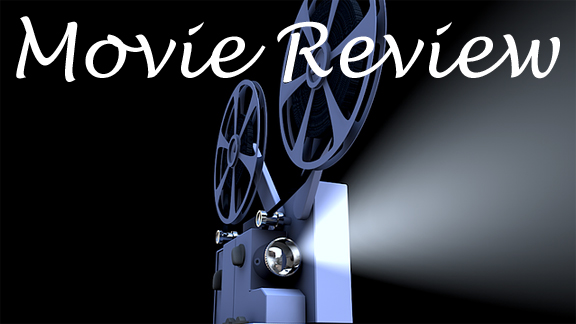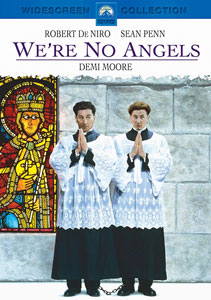Following two escaped convicts who take cover as “priests” in a small American town along the Canadian border in the 1930s, “We’re No Angels” (1989) doesn’t have the biggest hook among David Mamet’s writing resume. But because the premise is so straightforward, it stands as a stark example of his sharp situational plotting skills.
Over the course of 106 minutes, Neddy/“Father Riley” (Robert De Niro) and Jimmy/“Father Brown” (Sean Penn) nearly get caught several times, but always get out of their scrapes thanks to humorous random chance.
Bizarre contrast
With continual reminders of the bizarre contrast between pious folk and these desperate convicts, I think “We’re No Angels” is funnier than “State and Main” and more focused than “Things Change.” Although it makes sense that this film wouldn’t be for everyone, I’m surprised to find out its fan base is almost zero.

“We’re No Angels” (1989)
Director: Neil Jordan
Writer: David Mamet; Ranald MacDougal (earlier screenplay)
Stars: Robert De Niro, Sean Penn, Demi Moore
Directed by Neil Jordan, “We’re No Angels” isn’t quite a laugh-out-loud comedy, but it is a smile-on-your face comedy. Mamet walks a fine line in that he’s using the Christian faith and church trappings for subversive humor, yet he’s not being mean-spirited toward religious people. He plays up the absurd contrast of the uncouth Neddy and the somewhat simple-minded Jimmy ending up in this undercover situation.
It’s impressive how the film avoids pushing a viewer’s suspension of disbelief past the breaking point with this premise. In any given moment, we can see how the townsfolk would assume these are indeed the two visiting priests they have been expecting, even if Neddy and Jimmy are slightly unorthodox.
Mamet works from a premise devised by the 1955 film of the same name, but the specific scenarios are his own. It’s a pleasure watching Neddy and Jimmy come up with desperate excuses or solutions every time they are in a bind.
Fearing he’ll get caught in a hardware shop where he’s trying to remove his leg irons, Neddy throws a conveniently available cat out the doorway as an explanation for the noise he’s making. A young monk (John C. Reilly) asks Jimmy about the clothespin on his shirt (he had grabbed it off a clothesline), and Jimmy explains that he wears the pin as a reminder that he could be yanked away from his path if he’s not careful; the monk wears a clothespin in subsequent scenes.
Oh, and of course there’s the requisite scene of Neddy being called on for guidance while he’s hiding in a confessional booth.
Depression-era laughs
The gray and wintry setting is dreary for this type of comedy, but the architecture of the town is neat, with its boardwalks along the river. And the Depression-era setting provides verisimilitude, since in modern times the convicts would be caught immediately.
The appeal of “We’re No Angels” is boosted because these guys are a likable pair of convicts. As the film opens, they are roped into the escape by Bobby (James Russo). We don’t know what they did to get thrown in the penitentiary, but we do see the awful work-camp conditions and wouldn’t wish this on anybody, let alone these two. Once they’re in the town, Neddy and Jimmy are pulled along by the plot almost as much as the viewer is.

A strong cast also includes Demi Moore as Molly, who looks for financial opportunity in everything yet is desperately poor; “Gremlins’ ” Hoyt Axton as the head priest; and “The Princess Bride’s” Wallace Shawn as, well, Wallace Shawn.
Not that we need much of a break from the lead duo’s shtick: De Niro’s facial expressions become increasingly wacko (perhaps too much so) as the scenarios get stranger and more desperate, while Penn plays up Jimmy’s innocence, making us root for him when he’s thrust behind a microphone on multiple occasions.
They find their own meaning
It’s neat how these improvised speeches from Jimmy, who knows nothing about what a religious crowd expects to hear, play perfectly well as he spouts off about his own troubles. Because he’s not a verbose nor articulate speaker, Jimmy speaks in vague generalities, so the churchgoers find their own meaning.
Another neat trick by Mamet: The film makes fun of religion throughout (if in a loving way), yet on the whole, it’s an argument in defense of miracles.
Granted, “We’re No Angels” is too one-note to have the rewatch value of Mamet’s top-shelf work, and the premise doesn’t have the wide contemporary appeal of “State and Main,” a satire of Hollywood filmmaking.
Although the filmmakers no doubt hoped the star power would make up the difference, “We’re No Angels” was probably hurt by being unappealing on the surface to both religious and non-religious moviegoers, with both groups assuming the film isn’t for them. But it’s actually for anyone who enjoys a smartly crafted comedy.

